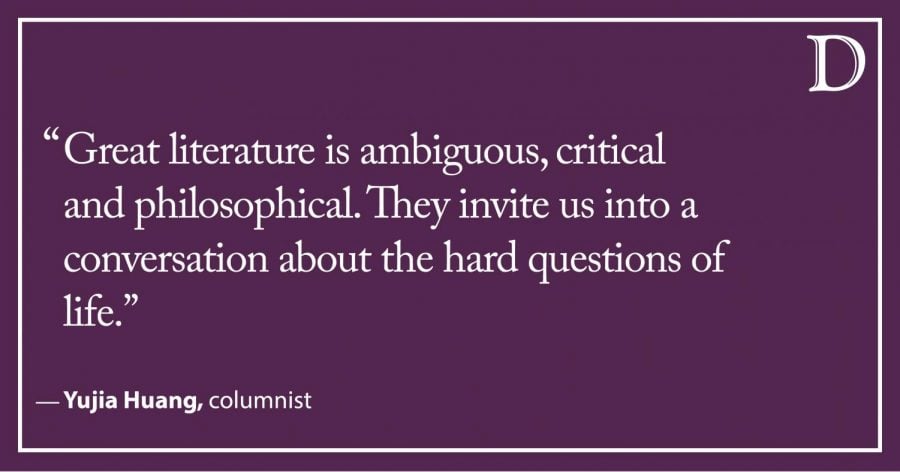Huang: Why aren’t all good books good literature?
February 17, 2020
Why do we read? What distinguishes noteworthy literature from purely pleasure-driven reading? Is it inherently better to read for wisdom and morality than to read for pleasure? Though I do not claim to have the answers to these questions, I do believe that all types of book-reading will remain a salient part of our human experience.
As an English literature major, my list of reading includes famous writers of the English literary canon, from Mark Twain and Miguel de Cervantes to Jane Austen and Walt Whitman. If you visit my private bookshelf for books to read for pleasure, you probably won’t have much luck.
There is a difference between “high reading” and “low reading.” The former, books I read for English class, are often viewed as part of the “great literary canon.” They are classic books that withstand the test of time and offer universal wisdom and insights. What about the latter? The ones we open to decompress on a Friday night to avoid thinking about the eight-page paper due the next day and the midterm next week?
One of my most memorable experiences of reading what some may call a trashy book was in middle school. It was the first time I read a novel in English: Veronica Roth’s “Divergent.” I remember opening the first page and immediately being enthralled by the world of the Erudite, Abnegation and Candor factions.
I devoured the book, unable to put it down during class, as dopamine rushed to its utmost high as I flipped over the novel page after page, transported into the world that Veronica Roth composed. Even though I had no idea what 20 percent of the words meant because my English was rather poor at the time, I managed to piece together the plot and thoroughly enjoyed the experience as I finished the ending.
What separates books like “Divergent” from books like “Don Quixote?” For me, the major difference lies in whether a book contains a story or poses questions that are larger than its plot. Every novel has a plot, but not every book contains a deeper story or moral question.
For example, “Don Quixote” is about a crazy guy who dresses up as a knight to fight evil in the medieval world. Yet it is considered a classic not just for its hilarious, well-contrived plot, but for the questions it poses. Cervantes’ book leaves us with difficult, life-threatening questions. How do we live in a modern world that is changing constantly? What are the values we value today in our capitalistic society, and is something missing? What constitutes a good life. Should we pursue it even at the cost of our death?
For me, this is what distinguishes timeless reading from pleasure reading. Books that are classics and taught in English class have great plots, but they are more than that. While dystopian fiction like “Divergent” can also be read as criticism towards our modern society, it is more plot-heavy and does not withstand complex analysis the way “Don Quixote” does. Great literature is ambiguous, critical and philosophical. They invite us into a conversation about the hard questions of life. They push us to ponder how we ought to live in this distraught modern world, even though these questions might sometimes take a lifetime to answer.
This is the power of good books.
Yujia Huang is a Weinberg junior. She can be contacted at [email protected]. If you would like to respond publicly to this op-ed, send a Letter to the Editor to [email protected]. The views expressed in this piece do not necessarily reflect the views of all staff members of The Daily Northwestern.


